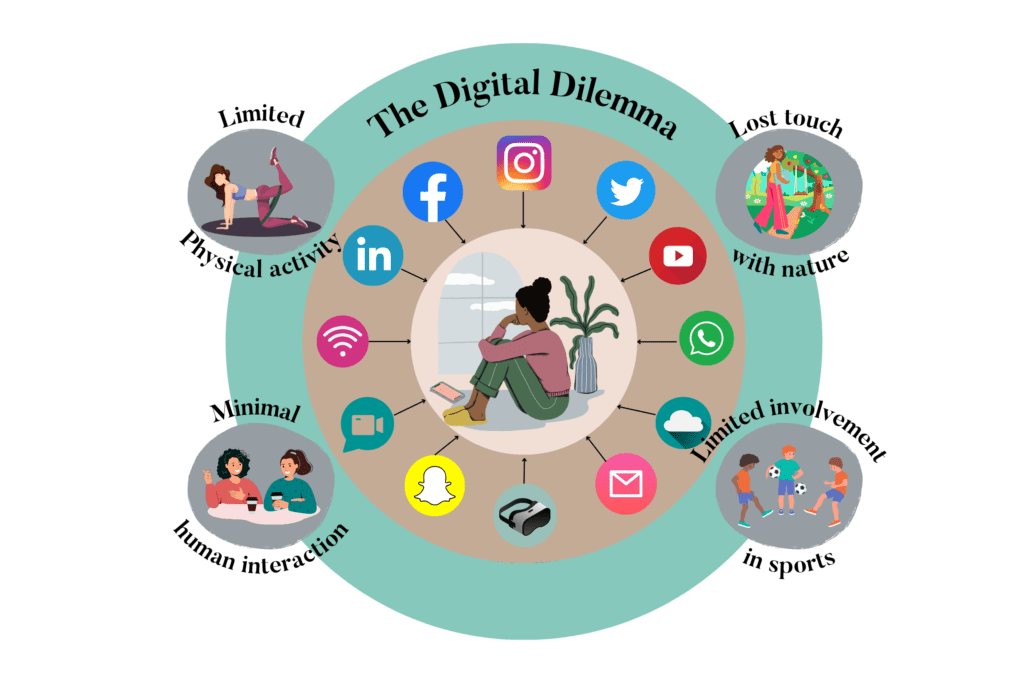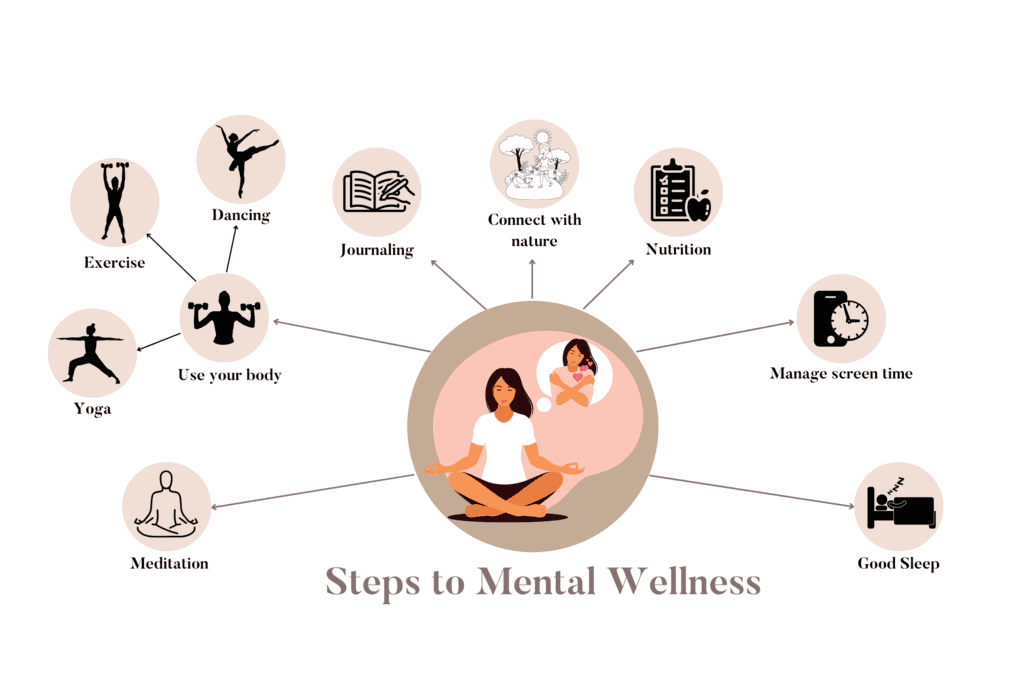
The world has come a long way in the field of medicine and healthcare. There was a time when diseases like Tuberculosis, Spanish Flu, the Black Death, and others caused widespread panic and fear. But most of them have now been eradicated.
Most physical health problems can now be effectively treated with advancements in technology and medicine and we are on the verge of finding cures for the remaining few. But we can’t say the same for mental health problems.
We’re now living in the digital age which has its own benefits and perks in terms of making our day-to-day lives easier, but it is also contributing to a growing mental health crisis.
We’ve become so dependent on technology that nowadays we have limited face-to-face interactions with our friends and family, we prefer playing online games over actual sports.
All this leads to a sense of loneliness and isolation. We are living in a world where we are losing touch with this planet as we rarely step out since everything is available or can be made available in the comfort of our homes. All these factors contribute to various mental health conditions.
Over the past couple of decades or so, mental health problems are on the rise and we are just beginning to understand the complexity of these problems. It will take time, effort, and resources to find effective solutions to these problems.

Have you ever googled depression or anxiety? If you have, you would have seen the images that come in the search results, each in a different shade of grey.
These images often depict a person with his/her head down in dark, gloomy settings, with hopeless facial expressions. That’s not what depression, anxiety, and other mental health conditions look like.
In reality, the actual face of people suffering from mental health conditions is a happy face often with a big smile, just like you and me.
They could be our friends, family, or colleagues and it can be difficult to identify if someone is struggling with any mental health condition because the symptoms are not visibly apparent like physical health problems and they may seem completely fit and fine from the outside.
Research suggests that one in five people have suffered an episode of depression in the span of their life and the number of people struggling with mental health conditions is increasing daily.
So there is a strong need for each one of us to understand the importance of mental health and how to maintain a state of mental wellness in today’s fast-paced world and beyond.
Table of Contents
What is Mental Wellness?
To understand the concept of mental wellness, we first need to understand what is mental health.
A Healthy Mind
The human brain is undoubtedly the most complex and sophisticated system in the known universe. Despite having such a powerful and remarkable tool, even the most brilliant people are only able to tap into a mere fraction of its full potential.
Yet, we often take the functioning of our brain for granted, failing to fully appreciate its immense power and capabilities.
If we just pay enough attention to our daily actions, we can clearly see the extraordinary precision and efficiency with which the brain operates. It enables the body to function seamlessly and allows us to navigate life with ease.
A healthy mind acts as a filter, sifting through the endless stream of thoughts, ideas, and stimuli that bombard us. It selects only those that are relevant to our current situation, enabling us to make informed decisions. It protects us from unfair comparisons, critical judgments, unnecessary fears, and worries.
While there are countless things that could potentially go wrong, a healthy mind is able to distinguish between what is plausible and what is likely. It keeps us at peace by not allowing us to dwell on far-fetched scenarios and instills in us the confidence to handle even the worst-case scenarios if they were to occur.
The brain also acts as a censor board, maintaining order in our thought processes. It has separate rooms for different kinds of thoughts, ensuring that inappropriate thoughts do not interfere with our daily activities, such as erotic fantasies while in a place of worship.
Through these mechanisms, a healthy mind enables us to lead a life filled with clarity, confidence, and peace.
The Mental Health Continuum
Now we understand the characteristics of a healthy mind, but what if the brain is not functioning as it should? Does it qualify as an unhealthy mind? Will it cause any mental illness? Well, the answer is not that straightforward. And the concept of mental health is not binary.
It’s best to think about mental health as being on a continuum or a spectrum rather than simply being mentally ill or mentally well. We all exist on that continuum and we move up and down depending on various factors such as our genetics, upbringing, and especially our lifestyle that includes stress levels, physical activity, and diet.
One end of the spectrum is where all the mental health disorders and problems exist and the other end is where we have positive mental health where people thrive and experience a sense of contentment and fulfillment.
While most people exist somewhere in the middle of the spectrum, unfortunately, the trend in recent times has shown a shift towards the negative end of the spectrum, with a growing number of individuals struggling with their mental well-being.
We are all human beings and experience different emotions every day depending on our situation. Sometimes we feel positive emotions like happiness, joy, and contentment while there are times when we feel negative emotions like stress, worried, anxiety, and sad.
And it’s completely normal because these are normal human emotions. But when these negative emotions become severe and persistent, interfering with our day-to-day lifestyle, they can potentially develop into a mental health problem.
And depending on where you stand on the mental health spectrum, you can experience different levels of problems or disorders.
Why is Mental Wellness important?
“Health is Wealth” is a phrase we have heard since childhood and we all understand the importance of good health, its significance cannot be overstated.
When our health is even slightly off like when we’re under the weather, we don’t feel like doing anything, nothing feels good, and getting well becomes our first priority. We know that without good health, nothing else in life truly matters.
No matter how important any other tasks may be, whether it’s an important day at work, or it’s an important function event to attend, nothing else matters and we drop everything to focus on being healthy again.
Rest we can manage later. So we all know that there is nothing more precious in life than good overall health.
It’s All Connected
It’s equally important to understand that every aspect of our health is significant and that both physical and mental health must be in good shape for us to experience a high quality of life.
So both physical and mental health is equally important. And an imbalance in one of them can have a profound effect on the other.
A recent study shows a higher risk of developing cardiovascular and metabolic diseases in people suffering from any mental health condition.
Similarly, people who consistently struggle with physical health issues tend to experience increased stress and anxiety levels. So mental health is just as important as physical health.
Good Quality Life
Being on the positive side of the mental health spectrum makes you feel confident and happy and puts you in control of your thoughts and emotions. You’re able to handle daily challenges and enjoy life to the fullest.
With a healthy state of mind, you feel good about yourself and are able to establish and sustain positive relationships with those around you. This, in turn, enhances the overall quality of your life and contributes to your overall well-being.
Factors Affecting Mental Wellness
We understand that having good mental health is crucial for leading a fulfilling life, but several factors contribute to poor mental health. Let’s take a closer look at some of these factors.
Biological
Biological factors are those that are related to the biological or physiological processes within the body and can have an impact on a person’s mental health. These factors play a crucial role in determining an individual’s mental health.
They can either directly or indirectly impact the functioning of the brain, causing mental health issues. Some common biological factors affecting mental health include:
- Genetics
- Biochemical disturbances
- Brain defects or injuries
- Infections
Environmental
The second bucket that contributes to poor mental health is the environment which includes our upbringing, life events, and current life circumstances that shape our mental well-being.
Our environment and experiences, especially during childhood, can have a profound impact on our mental health.
For example, childhood abuse, neglect, or trauma can increase the risk of developing a mental health disorder in adulthood.
Similarly, current life events such as job loss, financial problems, or relationship difficulties can also contribute to poor mental health.
Lifestyle
This third bucket is the lifestyle and personal habits which have become a major contributor to poor mental health in recent times, all because of our own actions and choices.
The rise of technology and the demands of modern-day jobs have led to a sedentary lifestyle, with limited physical activity and a poor diet.
Our daily routines have become so restrictive that we spend most of our working hours in front of a computer and the rest of our time on social media, with very limited opportunities for physical movement and exposure to nature.
This type of lifestyle has also led to a decrease in social connections, which is a key factor in maintaining good mental health.
We eagerly anticipate weekends for leisure and relaxation, only to be faced with the dreaded Monday blues when the work week begins again.
This cycle of stress and burnout, combined with the increasing prevalence of substance abuse, such as alcohol and drugs, has only added to the negative impact on our mental well-being.
Ultimately, it is our own actions and choices that are contributing to poor mental health, and it is up to each of us to make positive changes to improve our well-being.
Steps To Mental Wellness

Use Your Body
The importance of using your body and physical activities to maintain good mental health cannot be overstated. It is by far one of the most effective ways of improving both mental and overall health. Essentially within the human body, there is an allocation of energy for various functions like physical, intellectual, emotional, etc.
This differs from person to person. But the amount of energy allotted particularly for physical activity is going unused in today’s world.
This can lead to feelings of depression and other mental health problems. Without finding enough exertion for the physical body, they are bound to become depressive.
Participating in physical activities also increases the production of endorphins, which are natural mood boosters.
Connect With Nature
Our human body is made up of the fundamental elements of nature which are water, air, earth, light, and space. And in order for this body to be healthy and balanced, it’s extremely important that it remains in contact with nature.
But in today’s world, we watch sunrise and sunset on our phone screens and we either don’t have time or we don’t like to spend time in nature.
Losing connection with all that supports and manages our life will have serious implications on our overall health. So it’s essential that we maintain this connection by finding ways to be in nature. If you have a garden at your home, spend time there each day.
Take a walk barefoot and connect with the earth. If not, take a stroll to a nearby park and find a way to stay in touch with Mother Nature.
Nutrition
We have come a long way from our days as hunters and gatherers, to becoming the civilized individuals we are today. And the kind of world we live in, we have to be both physically and mentally sharp. In order to support that, eating the right kind of food is very necessary.
Maintaining a healthy mind and body requires a diet rich in fruits, vegetables, whole grains, lean protein, and essential fats.
A diet that is rich in these essential nutrients not only promotes overall physical health but also positively affects our mood and cognitive abilities.
It is unfortunate that our society obsesses about food and consumes processed foods, sugar, and unhealthy fats which have a very negative impact on our mental health because they increase inflammation in the body and decrease our ability to handle stress.
So it’s crucial that we make a conscious effort to improve our eating habits and adopt a diet that is rich in nutritious foods.
Meditation
Meditation is an extremely powerful tool that can help you improve your mental health and overall well-being. It reduces stress and calms the mind.
By taking a few moments to focus on your breath, sensations in your body, and thoughts without judgment, you can nourish your brain with happy brain chemicals, which help to keep it relaxed and calm.
There are a number of benefits of regular meditation such as improved sleep, good mood, and a positive outlook on life.
These positive effects can make a significant impact on both your mental and overall health, so incorporating meditation into your daily routine can be very beneficial.
Good Sleep
Getting adequate sleep is crucial for maintaining good mental health. Maintaining good sleep hygiene can help your body restore its natural balance and reduce stress levels. Aim to get around 8 hours of sleep every night and follow a consistent sleep schedule.
To enhance the quality of your sleep make sure you limit your exposure to screens before bedtime, and avoid coffee and heavy meals close to bedtime. Following these tips can help your body and mind relax, rejuvenate, and improve overall well-being.
Journal
Reflecting on your thoughts and emotions is one of the most powerful ways to boost mental health, as it helps you better understand and process your experiences.
Journaling helps you identify patterns in your behavior and thoughts and gain new perspectives on challenges and obstacles in your life. It also gives you a feeling of contentment and a sense of accomplishment.
You can start small by dedicating just 10-15 minutes each day. You can write about anything you like, from your daily experiences to your deepest thoughts and feelings.
The key is, to be honest and authentic in your writing and avoid the urge to censor or judge yourself. It’s a slow process, but over time, it can prove to be a valuable tool in improving your mental health.
We’ve got something special for you! Our shop offers a delightful range of options, catering to all preferences. Whether you’re drawn to the convenience of a digital journal or the tactile joy of a paperback, we have you covered.
Our thoughtfully designed journals, available in both digital and paperback formats, feature monthly, weekly, and two daily pages.
One page serves as your journal and planner, providing space to reflect, plan, and set intentions. The other page acts as a versatile tracker, allowing you to monitor your nutrition, mood, supplements, and so much more.
Manage Screen Time
This is one of the major contributing factors to the growing mental health problems. Lack of physical activity combined with excess screen time is the deadliest combination when it comes to spoiling your mental health.
Screens have become an inevitable part of our lives and they are great for staying connected, informed, and for entertainment, but too much screen time can have negative effects such as disrupted sleep patterns, eye strain, etc.
We cannot avoid screens completely in the modern world but to maintain a healthy relationship with screens, it’s crucial that you set boundaries and manage screen time effectively.
Here are a few things you can do:
- Limit screens before bedtime as screens emit blue light that interferes with the production of sleep hormones, making it harder to fall asleep.
- Take regular breaks to stretch your legs, move around, and focus on something other than the screen.
- Create a designated space in your home or office where screens are not allowed and you can focus on other activities, like reading, writing, or anything creative.
- Set aside specific times of the day when you will not be using screens. This can be during meals, after work, or during weekends
Wrapping Up!
Mental health is a crucial aspect of our well-being that cannot be overlooked in today’s fast-paced and technologically advanced world. Despite significant advancements in technology and medicine, mental health issues remain a challenge and require further understanding and solutions.
While technological innovations make our daily lives easier, they can also contribute to unhealthy lifestyle habits that negatively impact our mental health.
It’s essential that we maintain a balance in our lifestyle and find time for physical activities and human interaction in our daily schedule. Our health is ultimately in our own hands, and it’s up to us to prioritize it to ensure a fulfilling and healthy life. Namaste!
Although we strive to provide accurate general information, the information presented here is not a substitute for any kind of professional advice, and you should not rely solely on this information. Always consult a professional in the area for your particular needs and circumstances prior to making any decision.







Leave a Reply